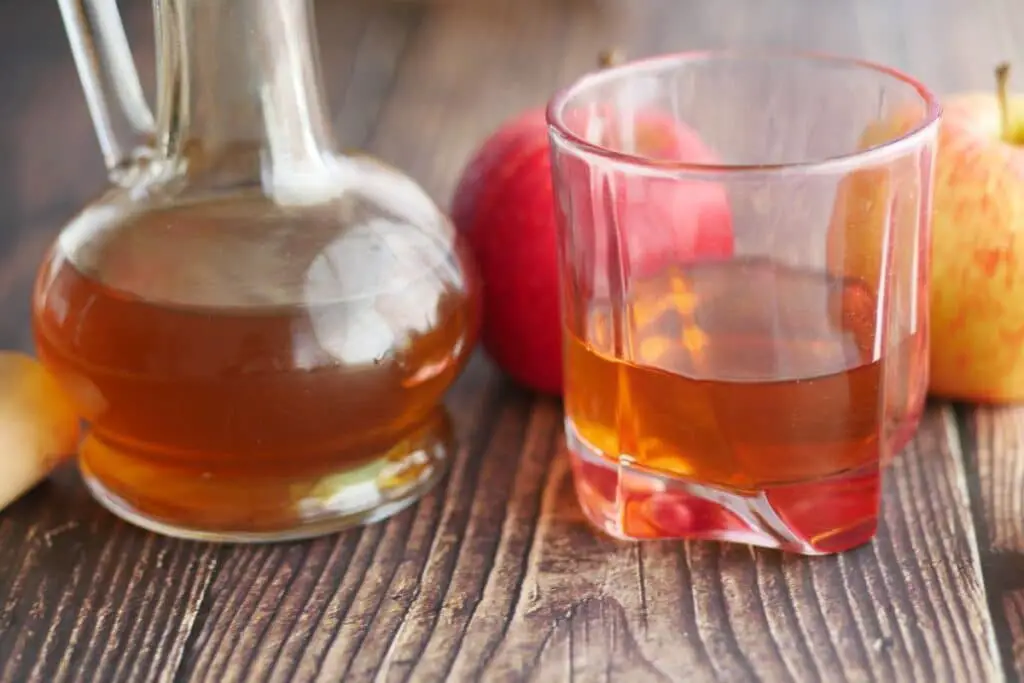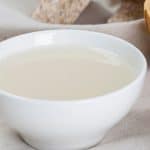In summary: There are some of the best substitutes for apple cider vinegar such as lemon juice, beer, lime juice, white vinegar, white wine vinegar, etc. Choose the substitute based on your recipe and taste preferences to achieve a similar flavor profile.
Known for its acidic punch, fruity notes, and health benefits, apple cider vinegar (ACV) is used in a range of dressings, marinades, chutneys, vinaigrettes, and even in baking.
If it’s not something you don’t generally have on hand, or if you happen to be out of stock, there are a number of other ingredients you can easily use instead. So don’t run to the store just yet.
The best apple cider vinegar substitute for your recipe will depend on the purpose it serves in your dish as well as the flavor and acid strength. In this guide, we’ve made it easy for you to find the best apple cider vinegar alternative.
Check out the options below and our recommended uses for each one.
What Is Apple Cider Vinegar?
This vinegar is made from fermented apple juice. The juice is extracted from apples, after which yeast and bacteria are added to start fermentation.
The first fermentation converts sugars to alcohol. After this, it undergoes a second fermentation with acetic acid-forming bacteria that converts the alcohol into vinegar.
Raw unfiltered apple cider vinegar is said to have a slightly more complex flavor. It is a touch murky and contains bits of bacteria and yeast known as ‘the mother’ which is what gives the product its beneficial health properties. This can also be used to make your own vinegar.
The filtered version, on the other hand, is slightly lighter in color and clear without any cloudiness. It does not contain the mother and therefore is not touted with the same health benefits. It is, however, popular for cooking and sometimes even used for cleaning.
ACV can be used for quick pickling, chutneys, preserving, and to brighten and bring a little kick to salad dressings. Small amounts can be added to cooking liquids and marinades. Since acid helps to activate certain leaveners in baking, it is also useful in many baking recipes.
Best Apple Cider Vinegar Substitutes?
#1. Lemon Juice
With a similar acidity level, lemon juice is one of the best alternatives. Whether you have fresh lemons or a bottle of pre-squeezed juice from the store, either can be used as a replacement to add the acidic punch you need as well as a slight fruity tang.
Lemon juice is often used to activate the leavening agent in baked goods and turn milk into buttermilk quickly when required in batters. It can be used as a replacement in equal quantities.
Best used for: Dressings, marinades, vinaigrettes, preserving, baking, and sauces for fish and poultry dishes.
#2. Lime Juice
Limes have a stronger acidity than lemons, but also provide a great fruity undertone with their acidic punch. If you have fresh limes, it may be labor-intensive to squeeze a large amount of juice.
They are, however, ideal in small quantities or, as with lemon juice, you can use the pre-squeezed liquid for an easier solution. Lime juice can be used as a replacement in equal measures.
Best used for: Dressings, marinades, vinaigrettes, as well as cooked chicken and fish dishes.
#3. White Vinegar
Distilled white vinegar can have either a similar or slightly higher acidity than apple cider which makes it suitable to replace in a 1:1 ratio. It is a clear liquid, and besides its acidic punch, it has a neutral flavor.
It therefore won’t alter the color or taste of your dish but does lack fruitiness. To fix this, add a squeeze of lemon, orange, or apple juice when using it as an apple cider vinegar replacement.
Best used for: Marinades, pickling, baking, and sauces.
#4. White Wine Vinegar
Although white wine vinegar is made from fermenting wine, it does not contain any alcohol. It has a less fruity taste than the apple variety, a slightly lighter color, and a similar acidity level.
You can use it in equal amounts and if you feel the fruity notes are too understated, add a squeeze of lemon, lime, or orange juice.
For a little more sweetness a few drops of apple juice can also do. This is a versatile option that pairs well with meat, poultry, pork, and fish dishes.
Best used for: Brining, vinaigrettes, braising, sauces, marinades, pickling, and dressings.
Related: White wine vinegar replacement
#5. Unseasoned Rice Wine Vinegar
Rice wine vinegar is common in Asian cooking and has a similar or slightly less acidic quality. It is very versatile for use in stir-fries, fish, poultry, and meat dishes as well as vegetable and rice dishes.
It has a slightly fruity taste which makes it a great match to replace in equal quantities.
Best used for: Vinaigrettes, cooked sauces, marinades, soups, pickling, and dipping sauces.
#6. Sherry Vinegar
Real sherry vinegar is a Spanish product made from fermented, barrel-aged sherry wine. You do, however, get lower-quality imitation types as well.
It has a unique, bold taste that is somewhat different from the apple variety but its acidic profile and color are similar. We suggest starting with a 1:1 substitute ratio and adding a little more to taste.
Best used for: Vinaigrettes, dressings, and marinades.
#7. Balsamic Vinegar
With its very dark color, keep in mind that the color of your dish may be altered when using balsamic as an alternative in your recipe. It is not a great option for baking recipes but, on the other hand, is a suitable alternative for meat marinades that already have a dark color.
If this is something you generally have in the pantry, you’ve got an easy match in equal quantities. It has a slightly sweeter taste and a similar fruity undertone.
Best used for: Vinaigrettes, dressings, and marinades.
See more: Substitutes for balsamic vinegar
#8. Beer
If you have beer in the refrigerator, you’re good to go! We know you weren’t expecting this one, but it is a great option for meaty dishes.
However, we don’t recommend using it in uncooked dishes or salad dressings unless you want your salad to taste like you spilled a bottle of beer on it (no thank you).
Choose a mild-flavored beer with less bitterness and note that it doesn’t have the same acidity, so you may have to use more when using it as a replacement (no one ever complained about a little more beer). Replace it in a 2:1 or 3:1 ratio as preferred.
Best used for: Marinades, stews, braises, and cooked sauces.
#9. Champagne Vinegar
Although not generally a pantry staple, this option, unlike beer, can be used for dressings and vinaigrettes as well as rice dishes and soups. It has a good acidity level but a milder taste so you may want to use up to twice the amount your recipe calls for when using it as a replacement.
Best for: Dressings, marinades, vinaigrettes, pickling, baking, and sauces for fish, meat, and poultry dishes.
#10. Red Wine Vinegar
If the same fruity flavor is what you’re after, this is a good option. As its name suggests, it has a red color so may alter the shade of your dressing or sauce. If you are using it for pickling, the color will be quite prominent.
It isn’t as potent in terms of acidity, so if you prefer a milder salad dressing, this is a good choice. You’ll want to use just a fraction more than what your recipe calls for. If your recipe calls for two tablespoons, use 2.5 tablespoons as your substitute quantity.
Best used for: Dressings, marinades, vinaigrettes, stews, braises, and sauces.
#11. Apple Juice
Considering that apple cider is made from apple juice, it only makes sense that the juice can be used to replace apple cider vinegar. Here you will get the same fruity notes but with less acidity and a pretty sweet taste.
Since apple juice doesn’t have the acidity required to activate leavening agents, it won’t be suitable in baking recipes where an acid component is required for this purpose. It also won’t work for pickling but is great for pork dishes and curries.
When using apple juice as a substitute, use twice the amount called for in your recipe.
Best for: Dressings, marinades, vinaigrettes, stews, braises, and sauces.
#12. Orange Juice
Although orange juice is somewhat acidic it is not nearly as acidic as other alternatives on this list. It does, however, provide a lovely fruity taste with a bit of tang that pairs beautifully with chicken, duck, and pork.
Use it as a replacement in equal quantities and keep in mind that the flavor will be a little different.
Best for: Dressings, marinades, vinaigrettes, glazes, and sauces.
#13. Malt Vinegar
Although this isn’t a very common ingredient, if you do happen to have it in the pantry, it will do just fine as a substitute. Since it comes from fermented barley, it has more of a yeasty undertone than a fruity taste.
Depending on the brand it can either be similar in acidity or slightly less acidic. Use it as a substitute in equal quantities in almost any application.
Best for: Dressings, marinades, vinaigrettes, pickling, baking, and sauces for fish, meat, and poultry dishes.
FAQs
Conclusion
Although different types of vinegar and citrus fruits have varying acid levels and flavors, when chosen carefully they can successfully replace each other in small quantities.
In baking, regular white vinegar or lemon juice are the best replacements for apple cider vinegar while malt vinegar, white vinegar, and white wine vinegar are good options for pickling.
Use citrus juice including orange, lemon, and lime juice as a substitute for apple cider when making ribs or pulled pork dinners.
Whichever replacement you choose, make sure the flavor profile and color work well with the rest of your dish and don’t be scared to try something new.
See more:
*image by Towifqu/depositphotos









